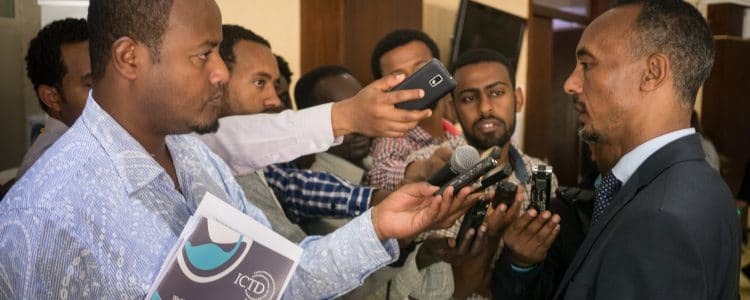
Tax avoidance by multinational companies is crippling inclusive economic development in Africa and reinforcing existing inequalities, such as the disadvantaged position of women. This phenomenon is not solely due to lack of capacity among national or local institutions in developing countries – the problem of tax loopholes is engrained in global power imbalances. A truly global democratic decision forum is the way forward to tackle tax avoidance and create an equitable tax climate.
Tax avoidance by multinationals has featured in the media in the past few years. NGOs and investigative journalists have gone to extreme lengths to uncover complex tax avoidance cases. After decades in which aggressive tax planning by multinationals was regarded as standard, these practices are increasingly being criticised. The shifting of public opinion and the growth of budget deficits have triggered international political processes by organizations such as the OECD and the EU to limit tax avoidance.
But, where do these developments leave developing countries, which are grappling to raise enough revenue to provide basic services to their citizens? It is becoming increasingly clear that one of the major drivers of the many problems facing developing countries is a failing domestic and international tax system. This contributes to budget deficits and an inability on the part of governments to provide high-quality essential public services to citizens. The effects of this lack of tax revenue are too diverse to list comprehensively, as they are felt by people in so many different ways. Readily known effects range from bad hospitals, inadequate infrastructure and poor education.
Yet, the impact of lack of tax revenue goes beyond lack of access to social services and inequality. For instance, tax avoidance also heavily impacts on the position of women in society. In many societies the absence of adequate public services in combination with low levels of emancipation forces women to engage in unpaid labour and care work, sometimes in addition to formal employment. In general, women are also more likely to rely directly on health services related to reproductive and maternal needs – services that are often unavailable or of substandard quality. A recent ActionAid report detailed the importance of tax for women by showing how improved tax regulation and collection can help to safeguard women from sexual harassment and assault.
Why capacity development won’t do the trick
Raising tax revenues is extremely important for developing countries, and particularly for their democratic governance. The lack of tax revenue currently generated by developing countries is partly caused by a lack of capacity to tax both national and international economic activity. Fortunately, a number of capacity development programmes are underway, including initiatives such as the Tax Inspectors Without Borders, which is co-funded by the Dutch government.
Is that all; will it fix the problem? No, solely investing in capacity without tackling the tax loopholes used by multinationals is like trying to empty the ocean with a thimble. The global tax system is broken and in need of a serious overhaul. Current legislation and practices often negatively influence tax collection in developing countries. Due to the differences in national tax systems and the many loopholes available to multinationals, many companies have created extremely complex business structures to shift their profits out of their own country, where their products are actually created, to countries with no or very low taxation. This is also due to weak rules in developing countries and weak agreements between developing countries and other countries.
Developing countries often try to attract investments from foreign multinationals by offering tax reductions or exemption – fiscal instruments that will cost these nations dearly in the long term. Developing countries are so desperate for investments, and the companies they are doing business with are so powerful, that developing countries often strike very bad deals.
One such example is the investment of Shell, Total and ENI in the production of liquefied natural gas in Nigeria, for which they received a 10-year tax break, despite the fact that they started to generate profit from year 5 onwards. After the 10 years expired, these companies managed to use the agreement to pay almost no tax for another 2 years. This tax exemption has cost the Nigerian people a staggering USD 3.3 billion. Although Nigeria is Africa’s biggest economy, more than 60% of its citizens live on less than a dollar a day. To put things into perspective, USD 3.3 billion is twice the amount of Nigeria’s annual healthcare budget and higher than the national education budget.
These problems not only surface when governments in developing countries are dealing with multinationals, they are also significant when they are dealing with other governments, especially those of tax havens (countries that offer companies little or no tax liabilities, including the Netherlands). A clear example is the negotiation of tax treaties. Tax treaties are designed to avoid international businesses paying tax on their profit twice. But, instead of ensuring that tax is paid only once, these treaties are used by multinationals in complex fiscal structures to achieve double-non taxation, commonly known as tax avoidance. OECD countries are pushing developing nations to agree with tax treaties that leave them with fewer rights to tax multinationals active in their country.
Towards an inclusive global tax environment
To reverse this negative trend, countries, and especially OECD members, should take into account the development impacts of their tax policies and bilateral tax treaties on developing nations, which need to be coherent with their development commitments. It is alarming to see OECD members, on the one hand, providing development assistance to developing nations, while, on the other hand, having fiscal policies and practices that negatively affect the collection of tax revenues in developing countries. Although tax is an issue for the sovereign state, the sovereignty of developing countries is limited. Companies have been able to lobby for low tax rates, driving a global race to the bottom. Unfortunately, corporate interests seem to be prevailing over public interest.
This is not just a matter of bilateral agreements with companies and national governments. In 2015 the OECD-led Base Erosion Profit Shifting (BEPS) process should have fixed the broken tax system for all countries. However, this process ignored the problems of developing nations and left them out in the cold. They are now welcome to discuss the implementation of the BEPS recommendations, however, in order to do so they have to commit to implementing the package, which they did not co-design.
A policy agenda for inclusive taxation
In 2015, the G77, the largest intergovernmental organization of developing countries in the United Nations consisting of 130+ members, tried to push for a global tax body to come up with democratic global tax reform, but this was halted by, among others, the OECD members. However, fortunately, it seems that developing countries will not take no for an answer: the president of Ecuador, the country elected to Chair the G77, has started a campaign in favour of a global tax body.
Due to the obscurity surrounding tax avoidance, it is not completely clear how much tax revenue is lost by developing nations each year, but the bandwidth ranges from USD 100 billion (by UNCTAD) to over USD 200 billion (by the IMF), indicating one thing: this is a serious issue on which more action is needed!






